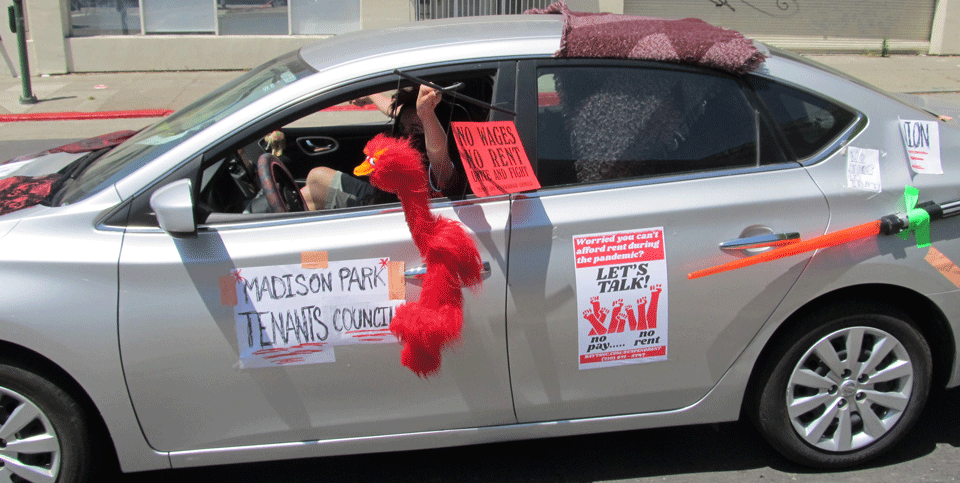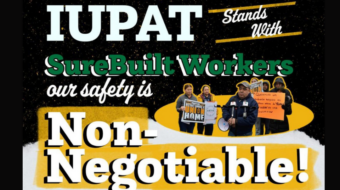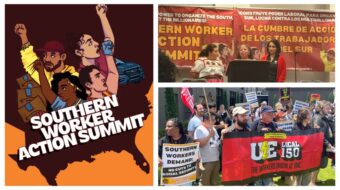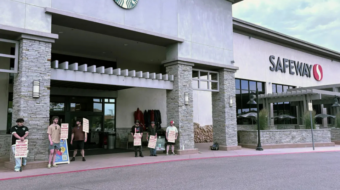
As throughout the country, the San Francisco Bay Area marked May Day with a variety of socially distanced and virtual actions calling attention to the vital role of frontline workers in the time of COVID-19, and demanding support for workers and their families facing economic perils intensified by the pandemic.
High on the list were caravans of cars, trucks, motorcycles and bicycles wending their way noisily through normally crowded business streets, proclaiming messages like “Housing is a Human Right,” “Health Care for All,” “PPE Now” and “Bail Out the People, Not Wall St.!”
One such caravan sent a stream of more than 100 cars, motorcycles and bicycles decked out with colorful signs and slogans through the streets of Oakland in the hours before and after noon. Starting from the Port of Oakland, they swung past Whole Foods, Target and other retail outlets whose workers were walking off the job or calling in sick to demand more personal protective equipment, cleaning supplies, sick leave and hazard pay.
Another wound its way through San Jose, demanding that local legislators cancel rents during the pandemic and calling for support to undocumented workers ineligible for federal aid.
In San Francisco, housing activists briefly occupied a long-vacant home in the Castro district. Two women now living in their vehicles – disabled former firefighter Couper Orona and dog-walker Jess Gonzalez – were supported by protesters from the Housing Rights Committee of San Francisco, Causa Justa/Just Cause and the Coalition on Homelessness. The action started with a “cancel rent” car caravan from Pier 50 on San Francisco Bay and ended several hours later after police surrounded the home.
Just days before May Day – on April 29 – Silicon Valley Rising, a campaign led by the South Bay Labor Council and Working Partnerships USA, brought frontline workers together with area Congressmember Ro Khanna, D-Fremont and Santa Clara County Board of Supervisors President Cindy Chavez in a virtual forum, “What Essential Workers Need.”
In opening remarks, Silicon Valley Rising’s campaign director, Maria Noel Fernandez, reminded participants, “The reality is that essential workers, in the midst of the coronavirus crisis, are all types of workers: fast food workers, social workers, cleaners, retail and transit workers, home health aides, nonprofit social service workers and more.” They are often not highly paid, they are disproportionately women and people of color, and they “are risking their lives at this moment.”
Among the seven workers sharing their experiences was Micaela Garza, a McDonald’s worker and a leader in Fight for $15, speaking in Spanish as she told the forum that workers at her store had to walk off the job three times before the fast food chain finally provided them with adequate PPE.
Though that was an important victory, she said, her co-workers and their counterparts across the fast food industry “still lack many important protections that we’ve been fighting for even before the pandemic.” Among significant problems: great difficulty in accessing paid sick leave. Many workers feel pressured to come to work even when sick, she said, “because if we decide to stay home we don’t get paid. If we don’t get paid, neither do our bills.”
Garza also told how after the walkouts, McDonald’s cut her hours, leaving her unable to pay rent in April and May. “We should not have to choose between our health and our next paycheck,” she said. “And if we feel the need to take action for better protections or to demand our rights on the job, we should be able to do so without fear of retaliation.”
From another food-industry vantage-point, grocery worker Rena Zagala expressed appreciation to her store’s management for providing workers with masks and gloves, but said what really made the difference was having plexiglass panels installed so she and other cashiers can talk with customers “without having them breathe on us or sneeze. That was made possible with the help of UFCW Local 5, and I’m really grateful they helped with that.”
Another worker with an essential food industry job is delivery driver Ala Benotman, a member of Gig Workers Rising, who delivers for companies like Door Dash and Grub Hub.
Even on days he spends 12 hours a day on the front lines with little protective equipment, Benotman said, he barely makes $100. “The companies I work for don’t really care about that, they do not have any minimum wage,” he said. “We deserve a living wage and hazard pay for all this (essential) work.”
Carlos Ramos, a Gig Workers Rising leader who drives for Lyft, said he is “misclassified” because Lyft refuses to implement Assembly Bill 5. The measure, passed by California’s legislature last year, says such drivers are employees, not independent contractors, making them eligible for Social Security, unemployment insurance, workers’ compensation, and overtime pay, as well as the right to organize.
“It is time for companies like Lyft and Uber to start obeying the law and to properly classify workers so they will receive the crucial benefits we need today,” Ramos said. “Gig workers are essential workers and all workers deserve dignity, safety and respect.”
Family childcare provider Vicky Ramirez, a member of the Child Care Providers Union, SEIU Local 521, said COVID-19 “is showing the world what we have long known to be true: our work is crucial” because while she and her fellow workers care for children during their most critical years, they also make it possible for parents to remain on their essential jobs.
But Ramirez always worries, because no matter how hard she works to clean and sanitize, she can never be sure it is enough. Having proper PPE would let her keep doing her job safely and effectively, she said, and “parents would have peace of mind knowing I am being properly supported to care for their kids.”
Also addressing the forum was Rosalie Garcia Bernal, a medical assistant at Kaiser Permanente in Milpitas, who told how her union, SEIU-UHW, helped her and her coworkers deal with major difficulties caused by the health care giant’s slowness to provide its staff with adequate PPE.
Cory Quevedo, a plumber, said his union, UA Local 393, is pressing for safe job sites before its members return to work, and is calling on elected officials to back the union’s demands for employer-paid family health coverage before workers are allowed onto a worksite, and for strong protections against employer retaliation for reporting health or safety violations.
Throughout the session, the chat line was full of comments from the many workers participating online, thanking Rep. Khanna and Supervisor Chavez for their support, and detailing problems on their jobs, much like those being described by the seven workers.
All the while, the two elected officials had been listening intently.
As the forum began, Khanna highlighted the Essential Workers Bill of Rights that he and U.S. Senator Elizabeth Warren, D-Mass., have introduced in both houses of Congress. The bill lists 10 basic requirements – among them health and safety measures, universal paid sick leave and family medical leave, and health care security – to protect frontline workers during the pandemic. He and Warren are pressing to make the provisions part of the next coronavirus stimulus bill.
After hearing the workers, Khanna said people who hadn’t previously been aware of the role essential front-line workers play “have suddenly started to think about all these workers who are invisible and suddenly they’re being noticed and appreciated. We should have had that perspective years ago.”
Chavez emphasized what the workers had said about the difference between having a union workplace and a nonunion workplace. When the pandemic hit, she said, the grocery workers’ union was able to work with the employers to put protections in place. This, in turn, helped Santa Clara County put in place guidelines to protect the workers, which were then broadly adopted. “And that had to do with your voice and your leadership,” she said.
In the forum’s closing moments, Silicon Valley Rising’s Fernandez told the online crowd, “This moment calls on us to fight like we have never fought before for the lives of our loved ones, neighbors, and the worker whose name you may not know, who cared for you today. It also calls on us to question how we want our world, our communities, to be in the long haul … Our invitation to you today is to take action with us that truly works toward building our communities as they should be.”










